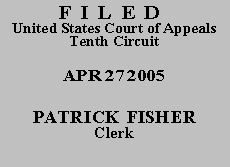

| LENDAL R. SMITH, III,
Plaintiff-Appellant, v. LES BROWNLEE, Acting Secretary of the Army; WHITE SANDS MISSILE RANGE, New Mexico, Defendants-Appellees. |
|
Plaintiff Lendal R. Smith, a former employee of the Department of Defense at the White Sands Missile Range (White Sands), proceeding pro se, appeals the dismissal of his complaint against defendants asserting claims under the Rehabilitation Act of 1973, 29 U.S.C. §§ 791-793 (Rehabilitation Act).(1) The district court granted White Sands' motion to dismiss or, in the alternative, for summary judgment. We affirm.
As a preliminary matter, White Sands contends this court lacks jurisdiction because Smith filed an untimely notice of appeal. Their argument is based on the incorrect premise that the district court's final order was entered on July 9, 2004. In fact, the district court docket sheet reflects that the final order, though dated July 9, was entered on July 12, 2004. "The date of entry is the beginning point for when the time period [for filing an appeal under Fed. R. App. P. 4(a)(1)] begins to run." Jenkins v. Burtzloff, 69 F.3d 460, 461-62 (10th Cir. 1995) Hence, Smith's September 10, 2004 notice of appeal was timely filed under Fed. R. App. P. 4(a)(1)(B), and this court does have jurisdiction over the district court's July 12, 2004 order of dismissal and its September 2, 2004 order denying Smith's untimely motion for reconsideration.
The parties are familiar with the facts and procedural history and we will not repeat them except as necessary for our analysis. Smith alleged Rehabilitation Act claims for wrongful termination based on his disability and for failure to provide a reasonable accommodation for his disability. In its thorough opinion, the district court dismissed Smith's claims because he failed to timely exhaust his administrative remedies. See Woodman v. Runyon, 132 F.3d 1330, 1341 (10th Cir. 1997) (exhaustion of administrative remedies is a prerequisite to suit under Rehabilitation Act). In particular, it is undisputed that Smith failed to initiate his equal employment opportunity (EEO) grievance within forty-five days of his termination, as required by 29 C.F.R. § 1614.105(a)(1), and then failed to file his civil action within ninety days of his receipt of the decision by the Equal Employment Opportunity Commission (EEOC) that affirmed the dismissal of his EEO complaint, as required by 42 U.S.C. § 2000e-16(c).
On appeal, Smith contends the district court erred in rejecting his arguments that the time limits governing his administrative remedies should be equitably tolled. We review the district court's grant of summary judgment de novo, and its decision not to apply equitable tolling for an abuse of discretion. Harms v. IRS, 321 F.3d 1001, 1006 (10th Cir. 2003). We have reviewed the briefs, the record, and the applicable law in light of these standards, and we conclude that the district court correctly decided that equitable tolling was not warranted. It is undisputed that Smith received in his termination letter notice of his EEO rights and the time line applicable for filing an EEO complaint. He thus has provided no grounds to excuse his untimely filings in the administrative process. Regarding his district court action, it is also undisputed that Smith failed to provide any basis to toll the statute of limitation on equitable grounds. His unawareness of the rules governing service of defendants which led to the dismissal of his first civil action is not a ground for equitable relief. See Montoya v. Chao, 296 F.3d 952, 958 (10th Cir. 2002) (holding that lack of diligence or lack of understanding of the law are insufficient grounds to invoke equitable tolling).
We therefore AFFIRM the judgment in favor of the defendants for substantially the reasons given by the district court in its Memorandum and Order entered July 12, 2004. The mandate shall issue forthwith.
Entered for the Court
Circuit Judge
*. This order and judgment is not binding precedent, except under the doctrines of law of the case, res judicata, and collateral estoppel. The court generally disfavors the citation of orders and judgments; nevertheless, an order and judgment may be cited under the terms and conditions of 10th Cir. R. 36.3.
1. Smith also asserted a claim for slander under the Federal Tort Claims Act (FTCA). The district court dismissed this claim because the FTCA explicitly states that the United States has not waived sovereign immunity for slander claims. 28 U.S.C. § 2680(h). Smith does not assert any challenge to that ruling on appeal.